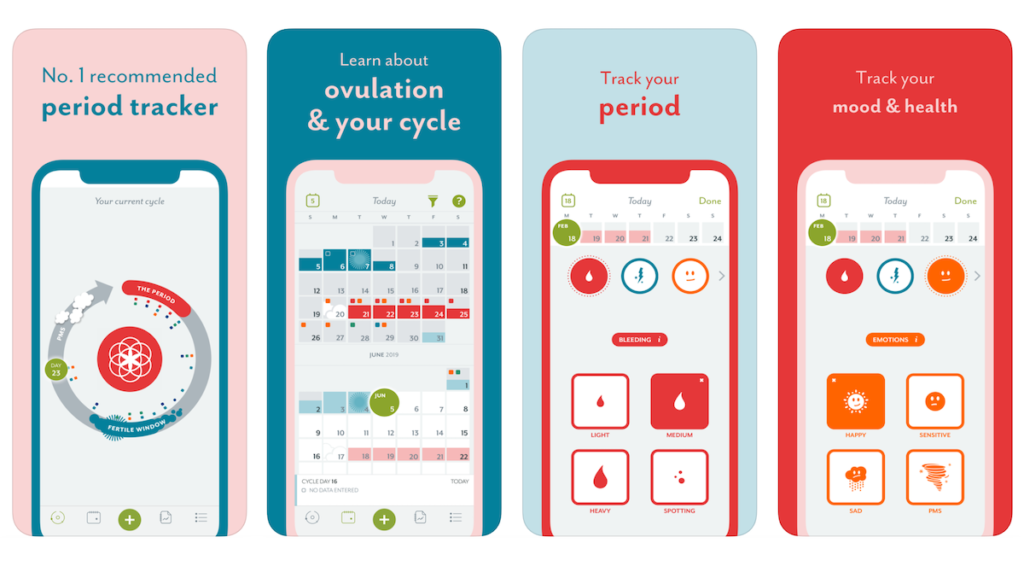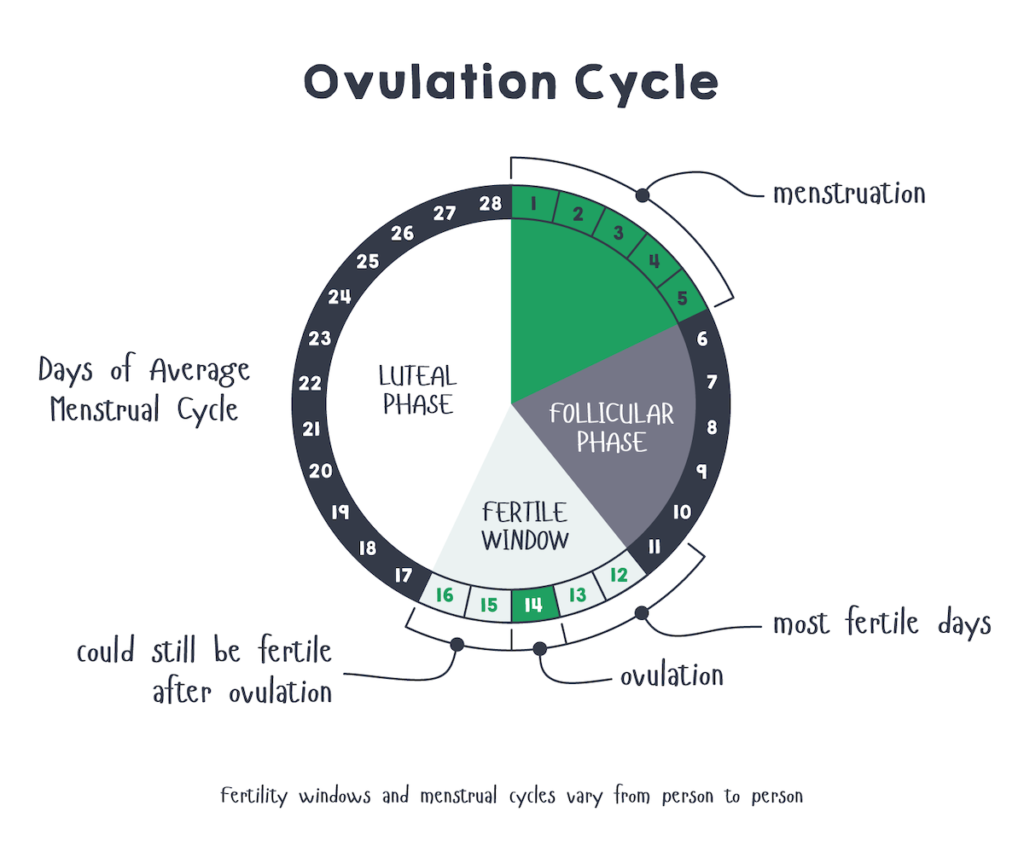An app backed by gynaecologists & trusted by 12 million women worldwide
Darcy, a 22-year-old New South Wales resident, says she’s often quite forgetful. She says on more than one occasion this forgetfulness has meant she couldn’t remember whether she had taken her birth control pill or not. Luckily, she says the Clue app has been a big help. With it, Darcy’s been able to track her period, as well as her mood, pain levels and sleep. She even gets notified when it’s time to take her birth control pill.
As much as Darcy likes Clue, she’s hardly alone. Today, the Clue app is rated 4.8 stars in the Apple Store from more than 200K reviews. The app has 12+ million users from over 190 countries, and was the winner of the ‘Best Fertility Apps of 2019’ by Healthline.
Clearly, Ida Tin, Clue’s CEO and Co-Founder, was on to something when she came up with the idea for the app back in 2009.

Above: Screenshots from Clue’s Apple Store page
The conception of Clue
Ida Tin, who co-founded Clue in 2012 explains, “I started Clue because I was puzzled that there had been so little innovation in family planning… why was it still not possible for me to really know what was going on in my body related to my reproductive health?
“I had questions like, ‘Can I become pregnant today?’ ‘Have I gotten pregnant?’ ‘What side effects will I have from different types of birth control?’ Even a simple thing like, ‘When will my next period come?’
“So, I started to build Clue. It’s a period tracking app, designed to help women and people who menstruate track their cycles and unlock the power of their bodies.”
While the value of Clue probably seems obvious today based on the immense popularity the app enjoys, Ida says this wasn’t always the case.
In fact, one of the most surprising things she learned as she prepared to take Clue to market was “the need to demonstrate the value and opportunity of a women’s health app in what is still a vastly male-dominated tech scene.”
Ida explains, “Cycle health affects 100% of the population. Even if you don’t experience a menstrual cycle yourself, you are almost certainly close to someone who does.”
“Women may be underrepresented in tech, but there is no denying that we are starting to make a name for ourselves within the industry – digital female health is one of the fastest growing sectors.”
“Now, taboos around fertility and menstruation are disappearing, and as they do, women want to know more about their bodies and the unique patterns of their menstrual cycle. Apps like Clue give women the power to identify patterns in their own body and to understand what these patterns mean for them.”
What Clue does and who it can help
In particular, Clue helps provide women with period and PMS predictions. Because users have the ability to track moods, PMS, ovulation, cramps, and more, Clue can help women uncover health patterns and better understand why they might feel a certain way depending on the time of the month.
Women can also set up calendar reminders for birth control, log their Body Basal Temperature (BBT) for more accurate ovulation predictions, and track irregularities to share with their doctor. Plus, Clue integrates with an assortment of other health apps, including Touch ID and Today Extension.
Ida says the app is designed for “anyone who menstruates and would like to track their period and understand their body’s unique patterns.”
She says, “We also launched Clue Connect, a feature that allows users to share their cycle information with a partner, enabling them to educate themselves on their partner’s body and support them throughout the different stages of their cycle.”
Based on the app’s rampant popularity, it appears to be resonating with a vast number of people. However, Clue isn’t just a favourite among women and their partners. It’s also a preferred app among health professionals.
A favourite among health professionals
Clue is the recommended period and fertility tracking app of Healthline, The Cut, and Obstetrics & Gynecology, a publication of the American College of Obstetricians and Gynecologists (ACOG). The app has also been recognised as the top free period tracker app by New York Magazine, Redbook, and Cosmo.
Part of the reason Clue is picking up the attention of healthcare professionals is the company’s contribution to scientific studies.
“In 2017, Clue launched helloclue.com – a dedicated menstrual health hub providing empathetic, reliable and scientifically accurate information regarding female health.”
Ida explains, “Clue is also contributing to ongoing scientific research looking at the various aspects of female health – users can opt-in to share their anonymised data with reputable scientific institutions, thus contributing an unprecedented data set to researchers.
“To date, our collaboration with the Kinsey Institute has looked at the ways in which technology is affecting our intimate relationships and sexuality, and was titled Technology & Modern Sexuality.
“Further, our collaboration with Oxford University has resulted in two published studies, titled: Is Female Health Cyclical? Evolutionary Perspectives on Menstruation and Do sexually transmitted infections exacerbate negative premenstrual symptoms? Insights from digital health.
“More broadly, we are working with universities and researchers around the world, and ongoing projects include collaborations with institutions like the Max Planck Institute in Germany, and Columbia University and Stanford University in the United States.”
Understanding the limitations of fertility apps
Recently, an Australian study found that over half of the most downloaded fertility apps didn’t perform well at predicting ovulation, which was the main reason they were downloaded.
In fact, after analysing 36 fertility apps, the authors of the study concluded that only 42.7% of the apps predicted the correct ovulation date and just 17.1% predicted the correct baby due date.
This lack of reliability is especially problematic when you consider the high number of women relying on these apps.
When I mentioned these findings to Ida, she explained that Clue doesn’t base predictions on a 28-day cycle length.
Instead, “At the actual end of a cycle – when the user has indicated that a new period has started – Clue will retroactively recalculate the date of ovulation to 14 days before the end of this past cycle and adjust the fertile window accordingly.
“… [That] window is estimated as being from 5 days prior to ovulation to 1 day past ovulation, including the day of ovulation.
“It is not possible to create accurate predictions of the fertile window based only on tracking your period, and Clue’s predictions are shown for informational purposes only,” Ida says.
“If the goal is to get pregnant, then tracking basal body temperature and cervical mucus can help users to identify more accurately when their fertile window is.
“If someone is trying to prevent pregnancy, they should not use Clue’s fertile window estimate as a form of birth control… Clue is an app that helps users learn about all aspects of female reproductive health. Clue is not – and does not – present itself as a contraceptive.”

Pictured: How a “typical” ovulation cycle works (Note: this does not constitute medical advice)
Surprising benefits of Clue
Like any period and fertility tracking app, Clue has its limitations. However, the app also has some incredibly valuable and unexpected benefits that go far beyond fertility planning.
For instance, Clue has actually been used as a tool to aid in diagnosis. Ida explains,
“A lot of the positive feedback we get from users is that Clue helped them get a faster diagnosis of conditions like polycystic ovary syndrome (PCOS) or endometriosis.”
“Both of these conditions typically take years to be diagnosed and treated, by which point the people affected by them develop complications. However, many of our users tell us that because they regularly used Clue, tracked their symptoms and were able to present these to their doctors, they received a diagnosis much sooner than they would otherwise.
“One piece of feedback that really stood out to me was from a woman who wrote to tell us about the fact that, because she used Clue to track some of the unusual changes in her menstrual cycle, she was able to flag this to her doctor, who was able to identify the cause of the symptoms as cancer. Because of the timely diagnosis, the woman was started on treatment far sooner than she would have been otherwise.”
The future of Clue
As exciting as all this is, Clue has even more in store for the future. When I asked Ida to tell us about Clue’s upcoming plans, she said, “… the ongoing goal is to continue advancing research into female health and to make basic information about reproductive health more accessible.
“Currently, we are focused on adding more educational content to our website, HelloClue.com, which is a source of unbiased, up-to-date and accurate scientific research, exploring all areas of the menstrual cycle, from the first period, through to sex, pregnancy and eventually, menopause.
“We are also working towards making Clue a sustainable business, and recently introduced Clue Plus, our premium offering, costing $9.99 per month. Clue Plus enables Clue’s features to remain free for all users, helps to support research into the world’s understanding of the menstrual cycle, and supports data privacy.
“Clue Plus subscribers are provided with exclusive content, a monthly email report with personal cycle stats, discounts and giveaways.”
To learn more about Clue, visit HelloClue here.

Ida Tin
CEO & Co-Founder, Clue
Ida Tin is the co-founder and CEO of Clue, the world’s fastest growing female health app. She has been featured in major media, including The New York Times, New York Magazine, Forbes, The Guardian and CrunchBase. Before starting Clue, Ida led motorcycle tours around the world. She wrote a book about her travel adventures, “Direktøs”, that became a Danish bestseller and received rave reviews. Ida currently lives in Berlin with her partner Hans, who also co-founded Clue, and their two children.



